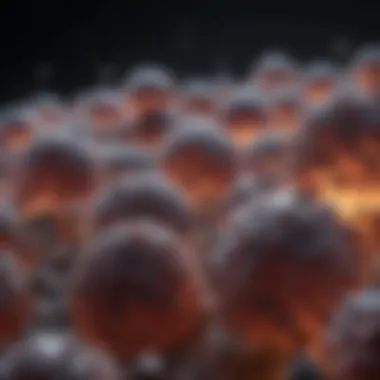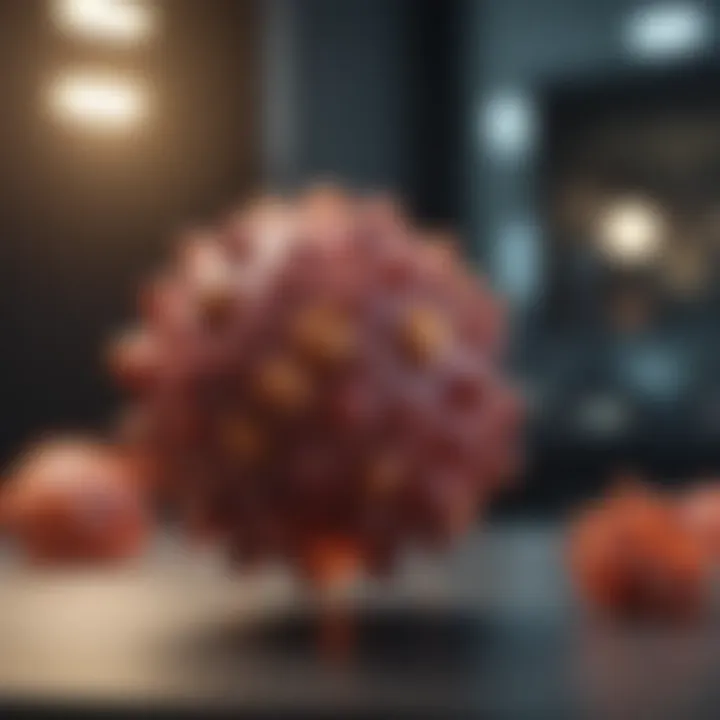Understanding PD1 Blocking Antibodies: Mechanisms & Future


Intro
The role of PD1 blocking antibodies has emerged as a focal point in the field of immunotherapy. These antibodies inhibit the programmed cell death protein 1 (PD1) pathway, which is crucial in regulating immune responses. By blocking PD1, these therapeutic agents enhance the immune system's ability to identify and attack cancer cells. This article explores this significant advancement, examining the mechanisms, applications, and future prospects of PD1 blocking antibodies. It seeks to provide clarity on the complex interactions inherent in this process and its broader implications for cancer treatment.
Research Highlights
Key Findings
Research on PD1 blocking antibodies, such as Pembrolizumab and Nivolumab, has revealed several impactful findings:
- Enhanced T-cell Activation: PD1 blocking antibodies can lead to increased activity of T-cells, vital white blood cells that play an essential role in the immune response.
- Tumor Microenvironment Modulation: These antibodies modify the tumor microenvironment, making it more conducive for immune cell infiltration and action.
- Durable Responses: Patients treated with PD1 inhibitors have shown long-lasting responses compared to traditional therapies.
The data indicate a significant correlation between PD1 blockade and improved patient outcomes in various cancers, including melanoma and non-small cell lung cancer.
Implications and Applications
The implications of using PD1 blocking antibodies are vast:
- Broader Cancer Treatment Options: PD1 inhibitors provide new avenues for treating cancers previously thought resistant to conventional therapies.
- Combination Therapies: Utilizing PD1 blocking antibodies in conjunction with other treatment modalities, such as chemotherapy or targeted therapies, can enhance overall efficacy.
- Potential for Adjuvant Therapy: Consideration of PD1 blockers as part of adjuvant therapy post-surgery presents opportunities for reducing recurrence rates.
Methodology Overview
Research Design
Studies investigating PD1 blocking antibodies typically employ a range of methodologies:
- Clinical Trials: Phase I, II, and III trials assess safety, appropriate dosing, and efficacy across diverse patient groups.
- Preclinical Models: Animal models are often used to explore pharmacodynamics and pharmacokinetics before human trials.
Experimental Procedures
The experimental procedures in PD1 blocking studies encompass:
- Patient Selection: Identification of eligible participants based on specific tumor types and prior treatment regimens.
- Dosing Regimens: Varying the dosing to evaluate the optimal balance between effectiveness and safety.
- Monitoring Outcomes: Regular assessment of tumor response and adverse events throughout the treatment period.
The End
PD1 blocking antibodies represent a transformative approach in cancer immunotherapy. As research unfolds, understanding their mechanisms, applications, and future potential can shape treatment protocols and improve patient outcomes. The detailed insights provided in this article contribute to the reader’s grasp of this vital topic, setting the stage for continued exploration and innovation in the field.
Preface to PD1 Blocking Antibody
The exploration of PD1 blocking antibodies represents a significant advancement in immuno-oncology. These antibodies have transformed treatment paradigms for various cancers. This section provides context about their essential role and sets the stage for understanding the mechanisms and applications discussed later in this article.
Definition and Overview
PD1, or programmed cell death protein 1, is a receptor found on the surface of T cells. This receptor plays a critical role in down-regulating the immune system and promoting self-tolerance by preventing T cells from attacking non-harmful cells. PD1 blocking antibodies are engineered to inhibit the interaction between PD1 and its ligands, PD-L1 and PD-L2. By blocking this pathway, these antibodies enhance T cell activation and proliferation. The result is a boosted immune response against tumor cells, making these therapies pivotal in modern cancer treatment.
Historical Context
The journey of PD1 blocking antibodies began in the early 2000s when researchers started to understand the PD1 pathway and its implications in immune evasion by tumors. The first antibody, Nivolumab (brand name Opdivo), was approved by the FDA in 2014 for advanced melanoma. Since then, other PD1 and PD-L1 blocking antibodies have received approval for various malignancies, including pembrolizumab (brand name Keytruda) and cemiplimab (brand name Libtayo). This historical backdrop underscores the rapidly evolving landscape of cancer immunotherapy, paving the way for innovative treatments and broader implications for patient care.
Mechanism of Action
Understanding the mechanism of action of PD1 blocking antibodies is crucial within the context of immunotherapy and their role in enhancing the immune response against cancer. The efficacy of these therapies hinges on their ability to disrupt inhibitory receptor interactions, which dampen T cell activity. By unraveling the mechanisms at play, researchers and clinicians gain insights into the potential benefits, limitations, and therapeutic considerations of PD1 blocking antibodies.
PD1 Pathway Overview


The programmed cell death protein 1 (PD1) pathway is a significant regulator of immune tolerance. PD1, which is expressed on T cells, binds to its ligands PD-L1 and PD-L2, known to be present on tumor cells and other immune cells. This binding initiates a series of downstream signaling events. The consequence is inhibition of T cell activation, which leads to decreased immune response against tumors.
- Role of PD1: PD1 serves as a brake on the immune system. Its activation results in a dampened response of T cells, preventing them from attacking either tumor cells or healthy tissues.
- Signal Transduction: Upon binding with its ligands, PD1 triggers signaling cascades that decrease T cell proliferation and cytokine production. This is an important mechanism for maintaining immune homeostasis but can be exploited by cancer cells to evade immune detection.
- Clinical Relevance: Understanding this pathway is important for developing therapies that can modulate this immune checkpoint.
Blocking Mechanism
PD1 blocking antibodies function by inhibiting the interaction between PD1 and its ligands. Commonly used agents, such as Pembrolizumab and Nivolumab, bind to the PD1 receptor itself, preventing it from engaging with PD-L1 and PD-L2. This blockade restores T cell activation and enhances the immune response against cancer cells.
- Competitive Inhibition: The antibodies compete directly with PD-L1 and PD-L2 for binding to PD1, disrupting the inhibitory signal.
- Enhanced Immune Activation: With this blocking action, T cells can proliferate and produce cytokines that are essential for effective antitumor responses.
- Therapeutic Outcomes: In many cases, patients experience significant tumor regression and improved survival rates as a result of this enhanced immune activation.
Impact on T Cell Activation
The impact of PD1 blocking antibodies on T cell activation is profound. By re-engaging T cells, these therapies can transform the immune landscape in tumors.
- Restoring Functionality: In tumors where T cells have been rendered ineffective, the blocking antibodies help to restore their functionality, facilitating the recognition and destruction of cancer cells.
- Cytokine Release: Activated T cells begin to produce various cytokines, such as interferon-gamma, which not only enhance T cell activity but also recruit and activate other immune cells.
- Long-term Memory Formation: The engagement of T cells can potentially lead to the formation of memory cells. This means the immune system can mount a faster response against recurrent tumors.
"Understanding how PD1 blocking antibodies re-modulate T cell responses offers a glimpse into future strategies for enhancing cancer therapies."
In summary, the mechanism of action of PD1 blocking antibodies encompasses a complex interplay of immune signaling pathways, emphasizing their role as crucial players in modern immunotherapy. The exploration of these mechanisms provides a basis for further research and optimization of treatments in the field of oncology.
Therapeutic Applications
The therapeutic applications of PD1 blocking antibodies represent a significant advance in medical science, particularly in the field of immunotherapy. These antibodies harness the body’s immune system to combat various diseases, most notably cancer. Understanding how these therapies work and their potential implications is essential for researchers, clinicians, and patients alike.
Cancer Immunotherapy
Cancer immunotherapy is possibly the most well-known application of PD1 blocking antibodies. The primary aim of this therapy is to enhance the body’s immune response against malignant cells. PD1 blocking antibodies, such as Pembrolizumab and Nivolumab, operate by inhibiting the interaction between PD1 and its ligands, PD-L1 and PD-L2. This blockade results in the reactivation of exhausted T cells, enabling them to detect and destroy cancer cells more effectively.
"The emergence of PD1 blocking antibodies has revolutionized treatment paradigms in oncology, providing options that were previously unavailable."
This therapeutic approach has demonstrated efficacy in several types of cancers, including melanoma, lung cancer, and renal cell carcinoma. Clinical trials have shown that patients treated with PD1 blocking antibodies often exhibit longer progression-free survival rates compared to traditional therapies. However, the response rates can vary significantly, underscoring the need for personalized medicine strategies.
In addition to efficacy, the safety and tolerability of PD1 blockers are critical factors. While many patients experience manageable side effects, some may face serious immune-related adverse events. Clinicians need to remain vigilant in monitoring for these complications and initiating timely interventions.
Other Disease Models
While cancer immunotherapy is the most prominent use, PD1 blocking antibodies are being investigated for a range of other disease models. Autoimmune diseases, chronic viral infections, and even some infectious diseases may benefit from this type of therapy.
Research is currently underway to explore the effects of PD1 blockade in conditions such as viral hepatitis and HIV. In these cases, the objective is to boost the immune response against persistent viral infections, allowing the body to control or eliminate these pathogens.
Additionally, conditions like type 1 diabetes and multiple sclerosis are being studied to determine if PD1 inhibition can restore immune regulation and minimize autoimmunity. Targeting pathways involving PD1 has the potential to shift treatment approaches towards immunomodulation, providing new avenues for therapies where traditional methods may fall short.
In summary, the applications of PD1 blocking antibodies extend far beyond cancer treatment, with significant potential in various fields of medicine. As ongoing research unfolds, understanding the underlying mechanisms and therapeutic contexts will be vital for harnessing the full capabilities of these innovative treatments.
Current PD1 Blocking Antibodies in Clinical Use
Understanding the current PD1 blocking antibodies that are clinincally used is essential for comprehending their impact on therapeutic strategies, especially in cancer treatment. These antibodies represent an innovative approach to harnessing the immune system against malignancies. Gaining insight into the currently FDA-approved agents provides a foundation for evaluating their roles and implications in modern medicine.
Key FDA-Approved Agents
Several PD1 blocking antibodies have gained FDA approval. These include:
- Pembrolizumab (Keytruda): This was one of the first PD1 inhibitors approved for clinical use. It is primarily indicated for advanced melanoma, non-small cell lung cancer, and several other malignancies. Pembrolizumab works by blocking PD1, thus enhancing T-cell response against cancer cells.
- Nivolumab (Opdivo): Similarly, Nivolumab is another significant agent that targets PD1. Approved for various cancers, its versatility in indications is notable, including Hodgkin lymphoma and renal cell carcinoma. Nivolumab's efficacy has been observed in multiple settings, both as monotherapy and in combination with other agents.
- Cemiplimab (Libtayo): This PD1 blocker has shown promise in treating cutaneous squamous cell carcinoma. Its approval marks a significant advancement in addressing this specific skin cancer form.
Each of these agents has different indications, yet all share the underlying mechanism of enhancing immune responses through PD1 blockade. This diversity allows clinician to tailor treatment plans according to individual patient needs.


Comparative Efficacy
The comparative efficacy of these PD1 blocking antibodies is crucial in determining treatment pathways. Research has shown that while both Pembrolizumab and Nivolumab are effective, their performance can vary based on cancer type and patient genetics:
- Pembrolizumab tends to offer improved overall survival rates in melanoma patients when compared to traditional therapies. Early results indicated that it can lead to durable responses, highlighting its strengths in this field.
- Nivolumab, on the other hand, has demonstrated effectiveness in a broader spectrum of cancers. Clinical trials have shown that its combination with ipilimumab results in higher response rates in metastatic melanoma compared to other combinations.
- Cemiplimab has specific advantages in target population for skin cancers, needing further studies to explore its efficacy against unrelated tumors.
Overall, the efficacy of PD1 blocking antibodies forms a continuously evolving landscape where ongoing clinical trials further inform treatment paradigms, revealing insights into optimal application across different patient demographics and tumor characteristics.
This comparison emphasizes the importance of personalized medicine, as choices among PD1 blocking antibodies may significantly impact patient outcomes.
As the understanding of PD1 blocking antibodies grows, so too does their potential role in advancing therapeutic modalities in oncology. This continuing exploration will ensure these agents not only expand in application but also in effectiveness.
Challenges and Limitations
The exploration of PD1 blocking antibodies reveals not only their potential but also the challenge sand limitations they present. Understanding these issues is crucial for researchers, practitioners, and patients alike. The effectiveness of any therapy is often shadowed by the complications that may arise, making it important to examine both the risks and benefits associated with PD1 blockade.
Resistance Mechanisms
The application of PD1 blocking antibodies has illuminated the phenomenon of resistance mechanisms in cancer treatment. Tumors can develop various strategies to evade immune detection and response, undermining the overall efficacy of therapies targeting PD1.
Microenvironment adaptation is one key mechanism. Tumors often alter their immediate environment to reduce the immunogenicity of their cells. Some cancers may upregulate other immune checkpoint pathways, such as CTLA-4 or LAG-3, providing alternative avenues for tumor evasion. This parallel pathway activation can significantly diminish the therapeutic impact of PD1 inhibitors.
Additionally, tumor heterogeneity presents another layer of complexity. Different cells within the same tumor may express PD-L1 at varying levels, leading to inconsistent responses across tumoral regions. This heterogeneity can make it difficult to predict and ensure response rates among patients.
Genomic alterations can also drive resistance. Mutations that impact the expression of PD-L1 or key signaling pathways involved in T-cell activation may render PD1 blocking strategies less effective. Therefore, identifying specific resistance markers is a pressing need for future research, allowing for personalized treatment strategies to be developed.
Adverse Effects
While PD1 blocking antibodies offer remarkable therapeutic possibilities, their use is not without adverse effects. Immune-related adverse events (irAEs) are a significant concern, as the activation of T-cells can lead to unregulated immune responses.
Common irAEs include dermatologic issues, such as rash and pruritus, as well as gastrointestinal complications, including colitis. These effects can range from mild to severe, impacting patients' quality of life and leading to treatment interruptions. Serious autoimmune conditions may arise, affecting the endocrine system e.g., thyroiditis, lungs, or liver.
Another aspect to consider is the psychological toll these adverse events may take on patients. Concerns about their health and treatment efficacy can lead to increased anxiety levels and undermine overall well-being.
"Recognizing and addressing adverse effects early in treatment can improve patient compliance and overall outcomes."
Future Directions in Research
Research on PD1 blocking antibodies is continuously evolving. It plays a significant role in shaping treatment methodologies in immunotherapy. Understanding future directions in this field is essential for researchers, clinicians, and patients. Several factors underpin the necessity for ongoing studies. First, this field has shown promising results in treating various cancers. However, there remain unanswered questions regarding long-term efficacy, safety, and optimal use.
Expanding upon current knowledge leads to improved patient outcomes. Research efforts need to address mechanisms of resistance that may develop upon prolonged exposure to PD1 antibodies. Since tumors may adapt to immune pressure, investigating these pathways can help design next-generation therapies. Additionally, patient selection criteria for specific therapies will require intricate analysis to maximize therapeutic impact.
A multi-pronged approach combining innovative methods with existing therapeutic models will be crucial. This ensures personalized medicine considers not only tumor type but also individual immune response.
Novel PD1 Antibody Developments
Recent advancements in PD1 antibody development are noteworthy. Several new antibodies are under investigation, aiming to overcome some limitations of existing therapies. For instance, Sym023 and ABBV-181 are examples of ongoing trials researching their effectiveness in different phases of cancer treatment. These new agents aim to optimize affinity and half-life, enhancing therapeutic potential.
Research is also examining bispecific antibodies, which target two different antigens simultaneously. This approach may increase specificity and reduce off-target effects. One such candidate is BITE, which engages T cells more effectively against tumor cells. Novel formulations and delivery mechanisms are being explored, ensuring broader applications and enhanced patient outcomes in clinical scenarios.
The continuous effort in refining PD1 blocking antibodies aims to improve their therapeutic efficacy and safety. This optimizes their use within a clinical setting.
Combination Therapies
Combination therapies present a substantial opportunity in optimizing PD1 blocking antibodies. The rationale behind this is straightforward; combining therapies can cater to a broader range of cancer subtypes and enhance overall efficacy. Many preclinical studies show increased effectiveness when PD1 blockers are used alongside chemotherapy or radiation therapy.


One prominent example is the combination of Nivolumab, a PD1 blocking antibody, with Ipilimumab, a CTLA-4 inhibitor. This combined approach has shown improvement in survival rates for advanced melanoma. Such combinations can unleash a more robust immune response, activating different pathways to fight cancer effectively.
Combining PD1 antibodies with targeted therapies is equally significant. Agents like Trastuzumab in HER2-positive cancers have illustrated how synergies between therapies can yield an enhanced therapeutic response.
Research also investigates integrating monoclonal antibodies with PD1 inhibitors, aiming to target intratumoral microenvironments. This may tackle the tumor's ability to avoid immune detection and ultimately improve therapy outcomes.
Ethical Considerations
Ethical considerations play a crucial role in the discourse surrounding PD1 blocking antibodies. As immunotherapy continues to evolve, it is important to address both the moral implications and practical aspects of treatment. The effectiveness of these therapies must be balanced with the ethical obligations to patients, researchers, and healthcare systems.
Patient Consent and Autonomy
Patient consent is a foundational principle in medical ethics. For treatments involving PD1 blocking antibodies, obtaining informed consent is essential. Patients should receive clear and comprehensive information about the nature of the treatment, potential risks, and benefits. This helps to empower individuals in their healthcare decisions and respects their autonomy.
When patients are involved in the consent process, they often feel more secure about their choices. This improves patient satisfaction and trust in healthcare professionals. Moreover, understanding treatment options fully can lead to better adherence and outcomes. Researchers and practitioners must ensure that consent is not just a formality but a genuine discussion that involves time for questions and considerations.
Equity in Access to Treatments
The availability of PD1 blocking therapies raises important issues of equity. These treatments, while promising, are often expensive and may not be available to all patients equally. Disparities in access can exacerbate existing health inequities, particularly among marginalized communities.
To address this challenge, it is vital that healthcare policies promote fair access to these therapies. Policymakers should consider various strategies, such as:
- Subsidizing costs for low-income patients.
- Encouraging pharmaceutical companies to create tiered pricing models.
- Enhancing public funding for cancer treatments.
By focusing on equity, the medical community can work towards a fairer distribution of resources, ensuring that all patients have the opportunity to benefit from the advancements in immunotherapy, including PD1 blocking antibodies.
"Equitable access to innovative treatments is not just a goal; it is a necessity for achieving health equity in society."
In summary, the ethical considerations related to PD1 blocking antibodies are multifaceted, addressing both patient autonomy and equity in treatment access. These elements will shape the future adoption and implementation of immune-modulating therapies in clinical practice.
End
In evaluating the role of PD1 blocking antibodies in the realm of immunotherapy, it becomes clear that these agents represent a significant advancement in medical science. They hold the potential to change how we approach cancer treatment and other immune-related diseases. As highlighted throughout this article, understanding PD1 blocking antibodies encompasses both a detailed examination of their mechanisms of action and the consideration of their clinical applications.
Summation of Findings
To summarize, PD1 blocking antibodies operate by inhibiting the programmed cell death protein 1 pathway. This leads to enhanced activation of T cells, which is crucial for generating an effective immune response against tumors. Key products currently in clinical use, such as Pembrolizumab and Nivolumab, have demonstrated clinical efficacy across various cancer types. The mechanisms behind their function include blocking the signal that would normally dampen T cell activity, therefore, facilitating a stronger immune response.
- Enhanced immune activation is observed with the use of PD1 blockers.
- These antibodies have been successful in multiple malignancies.
- Resistance mechanisms occur and present challenges to therapy, which need ongoing research and understanding.
"The use of PD1 blocking antibodies represents a monumental shift in cancer therapy, giving hope to many patients who previously faced limited options."
Implications for Future Research and Practice
Looking forward, the implications of PD1 blocking antibodies in research and clinical practice are profound. There is a necessity to explore combination therapies. Combining PD1 inhibitors with other modalities such as chemotherapy, targeted therapy, or other immunotherapies may enhance treatment efficacy. In addition, empirical studies must investigate the long-term effects and potential adverse reactions associated with PD1 blocking antibodies.
Research should also focus on understanding individual patient responses to PD1 therapy. Biomarkers that predict response could significantly enhance patient outcomes. Lastly, strategizing frameworks that ensure equitable access to these advancements in treatment is essential. The goal is to make effective treatment options available to diverse populations, thereby broadening the impact of PD1 blocking antibodies in clinical settings.
Key Literature
These formulations regarding PD1-blocking antibodies arise from extensive research delineated in academic journals, articles, and clinical studies. Some key pieces of literature include:
- Journal of Immunology: This journal publishes original research on immunological processes, including studies on PD1 and its receptor interactions.
- The New England Journal of Medicine: Renowned for its clinical research, this journal features crucial findings on the effectiveness of PD1 blocking antibodies in various cancers, contributing to their acceptance in clinical practices.
- Nature Reviews Immunology: This publication often synthesizes reviews and offers insights that help to navigate the field of immunotherapy, particularly the roles of PD1 and its antagonists.
These publications, among others, serve not only as a reference but also as a guide for further exploration into the mechanisms and effects of PD1 blocking therapies within oncology.
Resources for Further Reading
For readers who wish to extend their understanding beyond standard literature, several resources are available:
- Wikipedia: A starting point for a general overview, Wikipedia offers accessible summaries on PD1 blocking antibodies, their function, and applications.
- Britannica: While more formal, Britannica contains vetted information relevant to immunology that can provide deeper insight into the occasional complexities of PD1 interactions.
- Reddit: Community discussions on platforms like Reddit often provide additional insights, personal experiences, and emerging opinions on PD1 therapies, enriching the reader's understanding through diverse perspectives.
- Facebook Groups: Various groups focused on cancer research and immunotherapy also serve as informal but rich resources for networking and sharing the latest news in PD1-related research.



